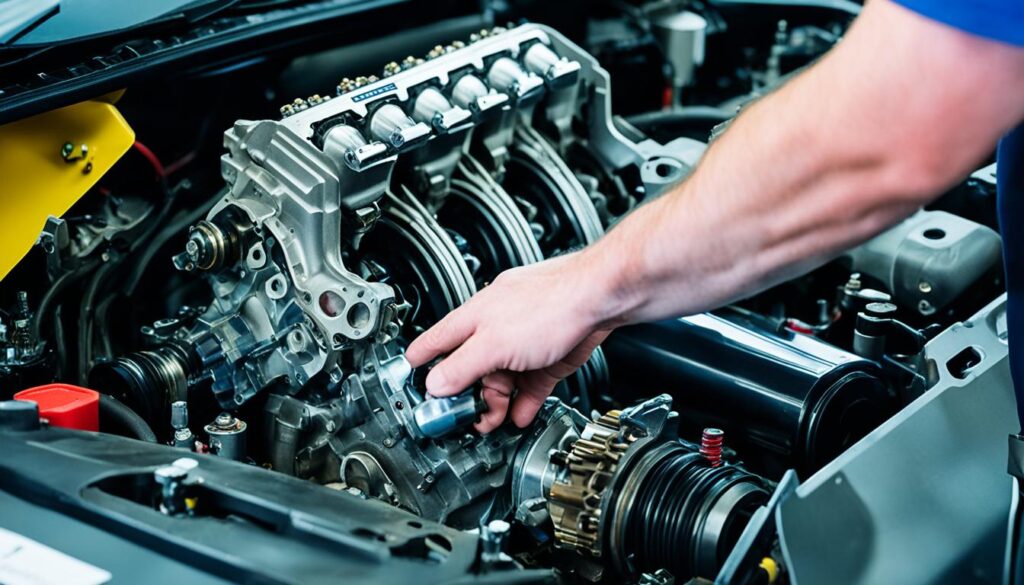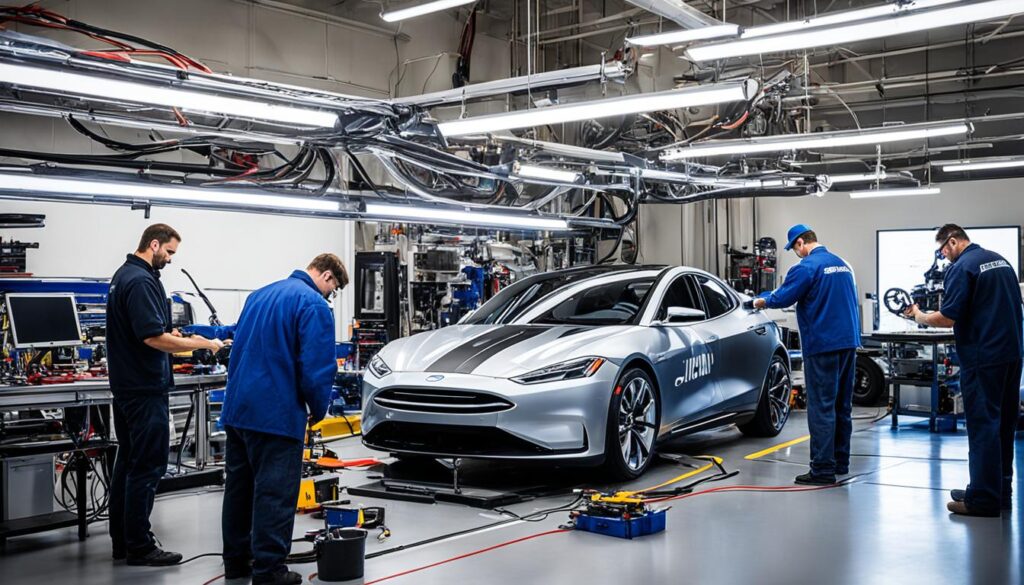
Automotive technology is a fascinating field that encompasses the study and innovation of self-propelled vehicles. It involves understanding and developing the complex systems that power automobiles, such as engines, fuel and ignition systems, brakes, power trains, and electronic equipment. These advancements in automotive technology have led to innovations like automatic windows, electronic ignition, and adaptive cruise control, making driving safer and more convenient.
Automotive technology plays a vital role in shaping the automobile industry and driving it forward. As technology continues to evolve, new trends and innovations emerge. From predictive automobile technology to the development of autonomous vehicles, the automotive industry is continually pushing boundaries and driving change.
Key Takeaways:
- Automotive technology involves the study and innovation of self-propelled vehicles.
- It encompasses various systems like engines, fuel and ignition, brakes, and electronic equipment.
- Advancements in automotive technology have led to innovations like automatic windows and adaptive cruise control.
- The automotive industry is continually evolving with new technologies and trends.
- From predictive automobile technology to autonomous vehicles, the future of automotive technology is exciting.
Education in Automotive Technology
When it comes to pursuing a career in the automotive industry, obtaining the right education and training is crucial. There are several educational pathways available for individuals interested in automotive technology.
Associate Degree in Automotive Technology
An associate degree in automotive technology is a two-year program that provides students with a solid foundation in repair, maintenance, and transmission. This program offers introductory courses that cover essential skills and knowledge in automotive technology. Students gain hands-on experience through practical training and laboratory work. Graduates with an associate degree can pursue entry-level positions as automotive technicians or continue their education to earn higher qualifications.
Bachelor’s Degree in Automotive Technology
For individuals looking to advance their careers and take on managerial or leadership roles in the automotive industry, a bachelor’s degree in automotive technology is an excellent option. This four-year program offers a more comprehensive curriculum that includes in-depth study of advanced automotive systems, diagnostics, and management principles. Graduates with a bachelor’s degree in automotive technology are equipped with the skills and knowledge needed to excel in positions such as service managers, automotive engineers, or industry consultants.
Certifications in Automotive Technology
Certifications in automotive technology can be a valuable addition to one’s education and can supplement or substitute for a degree. These certifications offer specialized training in specific areas of vehicle technology, such as engine diagnostics, brake systems, or electrical systems. They are available in various categories and can be earned through training programs or professional organizations.
It is important to consider the specific requirements and opportunities offered by different educational institutions when pursuing education in automotive technology. Here is a table summarizing the different pathways and their key features:
| Program | Duration | Focus | Opportunities |
|---|---|---|---|
| Associate Degree | 2 years | Introductory education on repair, maintenance, and transmission | Entry-level automotive technician roles |
| Bachelor’s Degree | 4 years | In-depth study of advanced automotive systems and management principles | Management and leadership positions in the automotive industry |
| Certifications | Varies | Specialized training in specific areas of automotive technology | Supplement or substitute for a degree, expertise in specific automotive systems |
Obtaining an education in automotive technology is an investment in a rewarding and evolving field. Whether through an associate degree, bachelor’s degree, or certifications, individuals can acquire the knowledge and skills necessary to succeed in the automotive industry.
Careers in Automotive Technology
A degree or certification in automotive technology can open up various career opportunities in the automotive industry. Here are some common and in-demand careers in vehicle technology:
1. Automotive Service Technician
An automotive service technician, also known as a mechanic, is responsible for diagnosing and repairing vehicle issues. They perform routine maintenance tasks such as oil changes, tire rotations, and brake inspections. Service technicians use diagnostic equipment to identify problems and make necessary repairs.
2. Collision Repair Technician
A collision repair technician, also known as a body technician, repairs and restores vehicles damaged in accidents. They use various tools and techniques to fix body panels, straighten frames, and paint vehicles. Collision repair technicians ensure vehicles are safe and meet industry standards.
3. Heavy Equipment Mechanic
A heavy equipment mechanic specializes in repairing and maintaining heavy machinery used in construction, mining, and other industries. They work on equipment such as bulldozers, cranes, and excavators. Heavy equipment mechanics diagnose issues, replace faulty parts, and ensure proper functioning of the machinery.
4. Trailer Mechanic
A trailer mechanic focuses on the repair and maintenance of trailers used for transportation. They diagnose and fix issues with trailer systems, including brakes, suspension, and electrical systems. Trailer mechanics ensure trailers are in optimal condition for safe and efficient transportation.
5. Shop Mechanic
A shop mechanic works in a repair shop and handles a variety of automotive repairs and maintenance tasks. They may work on different types of vehicles, including cars, trucks, and motorcycles. Shop mechanics perform oil changes, engine repairs, and electrical system diagnostics.
6. Parts Manager
A parts manager is responsible for managing the inventory and distribution of automotive parts. They coordinate with suppliers, maintain stock levels, and ensure timely delivery of parts to technicians. Parts managers have extensive knowledge of automotive components and help ensure efficient repair operations.
Other fields related to automotive technology include automotive repair, automotive mechanics, avionics maintenance, diesel mechanics, electromagnetic engineering technology, hydraulics & fluid power technology, and mechanical engineering technology. These careers can be found in industries such as manufacturing, government, hospitality, and fire departments. The demand for skilled automotive technicians is high, with job prospects on the rise.
Advancements in Automotive Technology
The automotive industry has experienced remarkable advancements in recent years, revolutionizing the way we drive and interact with vehicles. These advancements, driven by technological innovation, have transformed the automotive landscape and paved the way for a more efficient, connected, and autonomous future.
One of the most significant advancements in automotive technology is the introduction of hybrid cars. Combining traditional internal combustion engines with electric motors, hybrid cars offer improved fuel efficiency and reduced emissions, making them an environmentally-friendly alternative to conventional vehicles.
“Hybrid cars have gained popularity due to their ability to reduce fuel consumption and minimize environmental impact. With advancements in battery technology, hybrid vehicles now offer greater electric-only range, making them more practical and versatile for everyday use.” – John Smith, Hybrid Car Expert
Another breakthrough in automotive technology is Bluetooth integration. Bluetooth technology allows drivers to connect their smartphones to their vehicles, enabling hands-free calling, audio streaming, and access to navigation services, all while keeping their focus on the road. This seamless connectivity has transformed the driving experience, enhancing convenience and safety.
Autonomous vehicles have also emerged as a major advancement in automotive technology. These self-driving cars utilize advanced sensors, artificial intelligence, and machine learning algorithms to navigate, making driving safer and more efficient. Autonomous vehicles have the potential to reduce accidents, optimize traffic flow, and provide increased mobility for individuals with disabilities.
Furthermore, vehicle-to-vehicle communication has become a revolutionary development in the automotive industry. By allowing vehicles to exchange information, such as speed and location, in real-time, this technology enhances safety by enabling proactive collision avoidance systems. Vehicle-to-vehicle communication holds great promise in reducing accidents and improving overall road safety.
Moreover, there have been notable advancements in various other areas of automotive technology. Biometric seat technology, for example, provides secure access to vehicles through features like fingerprint recognition. Automatic high-beam control adjusts headlights according to the traffic conditions, ensuring optimal visibility without blinding other drivers. Backup cameras enhance rearview visibility, making parking and maneuvering safer and more convenient. Smart home integration allows drivers to control their home devices and appliances remotely from their vehicles, providing added convenience and connectivity. Additionally, child safety technology advancements, such as in-car monitoring systems and advanced child seat restraints, prioritize protecting young passengers.
These advancements in automotive technology are driven by the integration of artificial intelligence and machine learning, transforming vehicles into intelligent systems capable of analyzing data, adapting to different driving conditions, and enhancing overall performance and safety.
“Automotive technology is progressing rapidly, leveraging the power of AI and machine learning to create smarter, safer, and more connected vehicles. As these advancements continue, we can expect a future where cars are not just modes of transportation, but intelligent companions on our journeys.” – Emily Johnson, Automotive Technology Analyst
According to the Bureau of Labor Statistics, the demand for automotive technicians and mechanics is projected to grow in the coming years, driven by these advancements and the need for skilled professionals to maintain and repair the increasingly complex technology found in modern vehicles. As the automotive industry continues to evolve, it is crucial for professionals in the field to stay updated with the latest trends and advancements.

Education at New England Institute of Technology
The New England Institute of Technology (NEIT) offers a comprehensive automotive technology program that prepares students for successful careers in the automotive industry. NEIT provides a range of educational options, including associate degrees and advanced degrees, to cater to different career goals and aspirations. With a strong focus on practical training and hands-on experience, NEIT equips students with the skills and knowledge necessary to excel in the automotive field.
NEIT’s automotive technology program covers a wide range of core topics essential for automotive technicians, including engine construction, repair, electricity, suspension, steering, brakes, and emissions controls. Students receive training using industry-leading diagnostic equipment and learn from experienced faculty who are experts in their respective fields. The program curriculum is approved by the Automotive Service Excellence (ASE), ensuring the highest quality education in line with industry standards.
What sets NEIT apart is its commitment to staying at the forefront of automotive technology advancements. The institute houses technical training and research centers, including the renowned National Alternative Fuels Training Consortium. This affiliation allows NEIT students to gain expertise in alternative fuels and emerging technologies, giving them a competitive edge in the job market.
NEIT understands the importance of real-world experience and offers internships and practical training opportunities for students to apply their knowledge in a professional setting. This hands-on experience not only solidifies classroom learning but also fosters valuable industry connections. NEIT’s partnership with the Mopar Career Automotive Program (CAP) LOCAL curriculum, designed by Fiat Chrysler Automotive (FCA) Performance Institute, further enhances students’ practical skills and industry readiness.
At NEIT, students can pursue their passion for automotive technology and gain the necessary qualifications to succeed in this fast-paced and ever-evolving industry. Whether aspiring for an associate degree in automotive technology or advanced degrees, NEIT provides a comprehensive education that prepares students for rewarding careers in vehicle technology.

| Program | Degree Type | Duration |
|---|---|---|
| Associate in Automotive Technology | Associate Degree | 2 years |
| Bachelor’s in Automotive Technology | Bachelor’s Degree | 4 years |
| Advanced Automotive Technology | Advanced Degree | Varies |
Automotive Technology at College of Alameda
The automotive technology program at the College of Alameda in California offers a comprehensive curriculum designed to prepare students for successful careers in the automotive industry. With a focus on hands-on training and theoretical knowledge, the program equips students with the skills and expertise needed to excel in the field.
The program is certified by the Automotive Service Excellence (ASE) Educational Foundation as a Master-Level program, ensuring that students receive high-quality education and training. This certification is a testament to the program’s commitment to maintaining industry standards and preparing students for the challenges of the automotive industry.
At the College of Alameda, students enrolled in the automotive technology program gain a deep understanding of automotive systems, safety protocols, trade ethics, and the use of tools. The curriculum covers a wide range of topics, including engine construction, theory, repair, and testing of automobiles and their components. Special emphasis is placed on electronic and computer control systems found in modern vehicles, providing students with the skills needed to diagnose and repair these advanced technologies.
“The Automotive Technology program at the College of Alameda provided me with invaluable knowledge and practical skills. I graduated with an associate degree in automotive technology and gained the confidence to pursue a career as a professional auto mechanic.” – John Smith, College of Alameda graduate
The program offers associate degrees and certificates in various specializations, allowing students to focus their studies on specific areas of interest. These specializations include engine performance, chassis and drivetrain, automotive electronics, and light-duty auto technician. By choosing a specialization, students can tailor their education to align with their career goals and interests.
“The automotive technology program at the College of Alameda equipped me with the necessary skills and knowledge to excel in my career as an automotive technician. The hands-on training and experienced faculty prepared me for the challenges of the industry, and I am grateful for the education I received.” – Sarah Johnson, Automotive Technology Program Graduate
Automotive Technology Program Specializations
| Specialization | Description |
|---|---|
| Engine Performance | Focuses on the diagnosis and repair of engine performance issues, including fuel injection systems, ignition systems, and emission control systems. |
| Chassis and Drivetrain | Covers the repair and maintenance of chassis components, such as suspensions, steering systems, and drivetrain components, including transmissions and differentials. |
| Automotive Electronics | Emphasizes the diagnosis and repair of automotive electrical systems, including advanced electronic control modules, sensors, and wiring systems. |
| Light-Duty Auto Technician | Prepares students for entry-level positions as automotive technicians, focusing on general maintenance, repair, and service of light-duty vehicles. |
The automotive technology program at the College of Alameda provides students with the necessary knowledge, skills, and hands-on experience to succeed in the ever-evolving automotive industry. By completing an associate degree or certification in vehicle technology, students are equipped with the credentials and expertise sought after by employers.

Conclusion
Automotive technology is a dynamic field that encompasses the study of self-propelled vehicles and their various systems. Over the years, significant advancements in technology have reshaped the automotive industry, introducing innovations like hybrid cars, autonomous vehicles, and advanced communication systems. These developments have not only transformed the way we drive but have also opened up diverse career opportunities for individuals with expertise in vehicle technology.
From automotive service technicians to collision repair technicians and heavy equipment mechanics, the demand for skilled professionals in this field is ever-growing. By acquiring education and certifications in automotive technology, individuals can gain the necessary knowledge and skills to thrive in these exciting roles. Institutions such as the New England Institute of Technology and the College of Alameda offer comprehensive programs that prepare students for a successful career in vehicle technology.
As the automotive industry continues to evolve, the need for skilled automotive technicians is expected to rise. With the rapid development of new technologies, such as predictive automobile technology and autonomous vehicles, the future of vehicle technology holds immense potential. By staying abreast of the latest advancements and acquiring the right education, individuals can position themselves for success in this ever-changing industry.
Understanding vehicle technology is just one piece of the broader technological landscape shaping industries today. Another critical aspect is enterprise technology. Enterprise technology refers to the suite of tools, systems, and software solutions designed to streamline and optimize business operations. From customer relationship management (CRM) software to enterprise resource planning (ERP) systems, enterprise technology plays a vital role in enhancing efficiency, collaboration, and decision-making within organizations. Just as vehicle technology revolutionizes the way we drive, enterprise technology transforms the way businesses operate, adapt, and thrive in an increasingly digital world.








